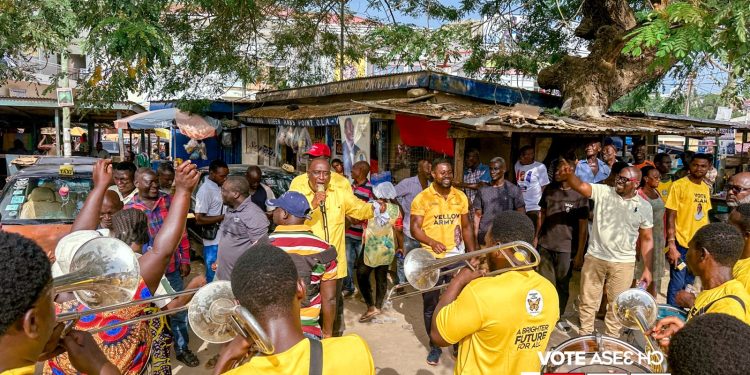Independent presidential candidate and leader of the Movement for Change, Alan Kyerematen, has called on Ghanaians to reject what he describes as incompetent leadership and the “destructive duopolistic system” that he claims has stifled the country’s progress.
Speaking in an interview with Kastle FM and during engagements with communities in the Central Region, Alan highlighted the failures of the two major political parties and presented his Great Transformational Plan (GTP) as the solution to Ghana’s persistent challenges.
“For 16 years each, both the NDC and NPP have ruled, yet both have led us to the IMF, failed to address youth unemployment, and left us with power outages. Why should Ghanaians continue to trust a system that only recycles failure?” Alan questioned.
“Both Mahama and Bawumia have had their chances to lead, yet they failed to bring about meaningful transformation. They mismanaged the economy, pushed us into the hands of the IMF, and gave us the burden of dumsor. It’s time for a change,” he asserted.
Alan positioned his Great Transformational Plan (GTP) as a comprehensive strategy for tackling the nation’s challenges. The plan focuses on revitalizing the economy, generating employment, and driving industrial and agricultural growth.
“We will expand agricultural and industrial production to create jobs, increase exports, and reduce imports. This is the only way to achieve sustainable development for Ghana,” Alan explained.
On agriculture, Alan emphasized the untapped potential of the Central Region, particularly in cocoa farming.
“This region is rich in both minerals and agricultural resources. Through my New Agriculture Revolution policy, we will invest heavily to make farming more profitable and attractive to young people,” he said.
Addressing the issue of illegal mining, or galamsey, Alan pledged to transition youth into responsible and sustainable mining practices.
“I will take mining licenses away from political appointees and give them to the youth to engage in proper mining. We cannot let a few greedy individuals destroy our land and water resources,” he stated firmly.
Alan also outlined plans for constitutional reforms to decentralize power, establish a second chamber of Parliament to replace the Council of State, and enhance the role of traditional authorities in governance.
“Our chiefs must be co-trustees of our lands and resources. My government will ensure that they play a central role in shaping our national development,” Alan added.
Focusing on the fishing industry, Alan reiterated his commitment to revitalizing the sector by empowering Ghanaians to own trawlers through the formation of a Ghana National Association of Fishers.
“It should not be only foreigners who benefit from our marine resources. We will invest in cold storage, fish processing plants, locally produced fishing nets, fiberglass canoes, and outboard motor assembly to reduce costs, increase accessibility, and create wealth for local fishers,” he explained.
Drawing from his successful automotive policy, Alan assured that these initiatives would revitalize the fishing industry and stimulate economic activity along the coast.
Alan also reaffirmed his vision to position the Central Region as the Tourism Hub of West Africa, leveraging its rich history, culture, and natural beauty.
“With strategic investments, we can attract global tourists, create jobs, and drive economic growth that will benefit local communities,” he said.
“This election is not just about changing governments; it’s about rejecting the destructive duopoly that has held us back for decades. With the GTP, we can build a prosperous, united, and self-reliant Ghana. Together, we can take control of our destiny and create a better future for all,” Alan concluded.


